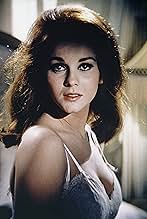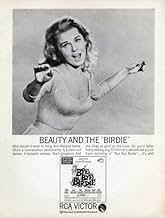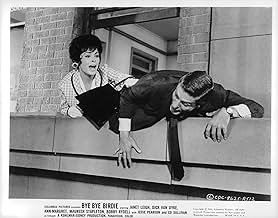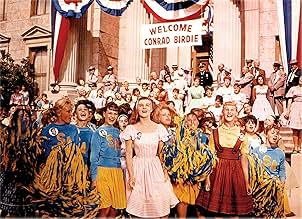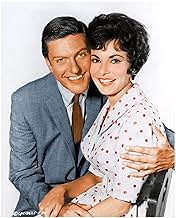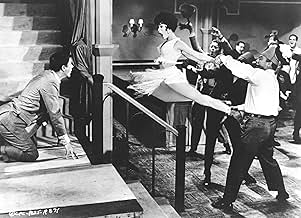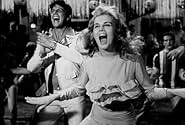Ein Rocksänger reist in eine kleine Stadt in Ohio, um seinen "Abschied" im Fernsehen zu feiern und seinen größten Fan zu küssen, bevor er eingezogen wird.Ein Rocksänger reist in eine kleine Stadt in Ohio, um seinen "Abschied" im Fernsehen zu feiern und seinen größten Fan zu küssen, bevor er eingezogen wird.Ein Rocksänger reist in eine kleine Stadt in Ohio, um seinen "Abschied" im Fernsehen zu feiern und seinen größten Fan zu küssen, bevor er eingezogen wird.
- Regie
- Drehbuch
- Hauptbesetzung
- Für 2 Oscars nominiert
- 7 Nominierungen insgesamt
Empfohlene Bewertungen
I am usually in the corner of those who complain about how Hollywood generally altered many classic Broadway stage musicals into something radically different when they were made into movies. Most of the time, the changes were ridiculous and weakened the property dramatically.
"Bye Bye Birdie" though, is the rare exception where the changes made to get it to the big screen were absolutely necessary. And nothing demonstrates this more than the fact that the faithful 1995 TV version is a lumbering, slow-moving mess that manages to demonstrate perfectly how what plays great on the stage does not always translate effectively to the film medium.
By contrast, the 1963 film version decided to make itself a bright, colorful film extravaganza that played to the strengths of the film medium. And the results in my opinion, worked wonderfully.
To a stage fan like "citybuilder" who rips the changes from the play, he needs to stop and think of how the structure of the stage version, which has the Sullivan show moment and the punching of Conrad as an Act I finale, would never have worked on film. It simply makes more cinematic sense to move that to the end. And the whole big deal over Rose's ethnicity, which was really done to showcase the talent of Broadway lead Chita Rivera, would have been a distraction as well because spotlighting Albert's mother as a racist would have gone against the whole tone of the movie (and truth be told "Spanish Rose" is not that great a song). Likewise, it's better to have Albert sing "Put On A Happy Face" to Rose rather than a nameless Conrad Birdie fan we never see again.
Dick Van Dyke and Paul Lynde offer the right amount of gravitas from the Broadway cast, Janet Leigh in her black wig gets to show off her dancing talent which she seldom got a chance to do (her singing is admittedly a bit thin, but she gets by), and of course Ann-Margret totally elevates the role of Kim McAfee into a star vehicle, and who can blame them for doing this? Her rendition of the title song written for the film is enough to leave one gasping for air, yet she still manages to be convincing as the wide-eyed teenager just the same.
Ultimately, stage fans can be satisfied that they got the version they prefer done on film (though it should be noted that the 95 version is not a pure rendition of the 1960 stage script, but rather the 1991 touring revival), but movie fans got the better end of things with this version in 1963. It will never be among the great movie musicals, but it is two solid hours of colorful early 60s fun.
"Bye Bye Birdie" though, is the rare exception where the changes made to get it to the big screen were absolutely necessary. And nothing demonstrates this more than the fact that the faithful 1995 TV version is a lumbering, slow-moving mess that manages to demonstrate perfectly how what plays great on the stage does not always translate effectively to the film medium.
By contrast, the 1963 film version decided to make itself a bright, colorful film extravaganza that played to the strengths of the film medium. And the results in my opinion, worked wonderfully.
To a stage fan like "citybuilder" who rips the changes from the play, he needs to stop and think of how the structure of the stage version, which has the Sullivan show moment and the punching of Conrad as an Act I finale, would never have worked on film. It simply makes more cinematic sense to move that to the end. And the whole big deal over Rose's ethnicity, which was really done to showcase the talent of Broadway lead Chita Rivera, would have been a distraction as well because spotlighting Albert's mother as a racist would have gone against the whole tone of the movie (and truth be told "Spanish Rose" is not that great a song). Likewise, it's better to have Albert sing "Put On A Happy Face" to Rose rather than a nameless Conrad Birdie fan we never see again.
Dick Van Dyke and Paul Lynde offer the right amount of gravitas from the Broadway cast, Janet Leigh in her black wig gets to show off her dancing talent which she seldom got a chance to do (her singing is admittedly a bit thin, but she gets by), and of course Ann-Margret totally elevates the role of Kim McAfee into a star vehicle, and who can blame them for doing this? Her rendition of the title song written for the film is enough to leave one gasping for air, yet she still manages to be convincing as the wide-eyed teenager just the same.
Ultimately, stage fans can be satisfied that they got the version they prefer done on film (though it should be noted that the 95 version is not a pure rendition of the 1960 stage script, but rather the 1991 touring revival), but movie fans got the better end of things with this version in 1963. It will never be among the great movie musicals, but it is two solid hours of colorful early 60s fun.
I tend to agree with Alice from Orlando regarding this film. While "Bye Bye, Birdie" is a terrific film with terrific performances, viewed today, it's also a tribute to an era that we'll never get back. I completely agree with those historians who feel that 1953 - 1963, the ten year period between the end of the Korean War and that dark day in Dallas, was the last real "Era of Good Feeling" in American history. By and large, we knew who we were, what we were, and where we were going. Then came political assasination, the "Summer of Love," Viet Nam, Watergate, et. al., and we have a society that's not sure of anything anymore. Happily, there are films like "Bye Bye, Birdie," made during the apex of the 1953-63 period, to remind those of us who came of age during that era what we've lost, and to show those who weren't there what it was like. Would that we all had a Sweetapple, Ohio, to go back to again.
This musical, for those of us who were of the age then, represents a time and a place we thought would not end. Entering our early teens in suburbia, begat of young war veterans, the biggest issues in our lives were those reflected in this film; who pinned who and the adulation of our musical icons. The whole world was Sweet Apple and "someday we would find out this was what life was all about" as Kim sings to a befuddled Hugo. Even nerds could fall in love. And an equal force in our weekly lives was the Sunday ritual of The Ed Sullivan Show. This is a beautiful homage to that world that would end seven months later in Dallas and bring with it the counter culture, riots and Viet Nam. Hard to put on a happy face... But you will with this score. More fifties and Bosa Nova then the hip sixties it is toe tapping and gets under your skin. Worth repeat viewings. And as always "I gotta be sincere..if you feel it in here.." and I still do.
When 'Bye Bye Birdie' was the hit of the '59-'60 season on Broadway, it was as much for its satirical edge as for the talent on stage or the innovative direction by Gower Champion. By that time it was only too clear to savvy adults that Elvis Presley and rock'n'roll had been thoroughly co-opted and mainstreamed by Hollywood and Madison Avenue. For all its supposed danger and subversiveness in 1956, Rock was a pop culture commodity like any other by the end of the decade.
And by the time BYE BYE BIRDIE hit the screen in 1963, that point was too obvious to have any edge. Presley had long since become a bland and unfashionable movie personality, and rock itself had devolved into the kind of inconsequential June/Moon tunes that in a slightly different form had been hit parade staples for decades.
So the point is, the teen world BYE BYE BIRDIE was parodying was largely gone by that time already. Just a year later, when the Beatles appeared on Ed Sullivan (ironically he was still a King Maker but not for much longer) that world began to dissolve and reform unforgettably. So BIRDIE is the swan song for an era and an expression of Baby Boom nostalgia for kids who were too young to have enjoyed the '50s in quite the same way their older brothers and sisters had. How many children in '63 thrilled to the vigorous twitching of Ann-Margret and Bobby Rydell, hoping that was the teen world that awaited them in the future, only to discover by '68 that alienation and anger were the currency of the day? Not that those emotions were misplaced -- the times themselves demanded them. But there was a sense of loss too, a sense that we had been cheated out of fun: silly, twitchy dances and full skirts and snug pastel pullovers. There's a reason this film made an indelible impression on children then, and perhaps most on girls and gay boys.
It was an old-fashioned musical in a movie era that was confused but evolving rapidly, and Ann-Margret was a transitional star of that moment. A throwback to another Hollywood, she gets the traditional star buildup here, and it works spectacularly. Like Rita Hayworth in GILDA, A-M was the good/bad girl -- fresh and sweet and direct enough to please any elder, but with a smoldering animal eroticism so potent the screen seemed barely able to contain it. She is hot in the runway opening and delicious thereafter but she doesn't really become a star until a pivotal moment in the 'Got A Lot Of Livin' To Do' number when her eyes narrow, she smiles and grits her teeth and her hands envelope the head of a chorus boy while she parses out the lyrics of female sexual emancipation -- Daddy won't know his daughter indeed.
It was a sexual call to action that kids understood and responded to. So THIS was what being a teenager would be like! In that moment and the few minutes that followed, even gay boys felt the tops of their heads come off. It's an excitement that doesn't return until the coda: once again A-M is on the runway, but this time any pretense that she is sweet, innocent Kim McAfee has gone -- this is Ann-Margret, and the sexual light and heat of a new star is palpable. Unfortunately, she was almost immediately to become outdated. Within a few years she was a joke in pictures, and had to wait until 1971 and CARNAL KNOWLEDGE to make a 'comeback' -- at the age of 30, no less. She had made the mistake of starting too late, and being too traditional a Hollywood star just when Hollywood decided to do away with stars, at least those that were provokingly lovely.
So BIRDIE trembled on the edge of a new, harsher era, and those of us who were caught on the cusp of that upheaval feel great affection for the fantasy of rock stars like Birdie, for Sweet Apple High, and for the bouncy, shiny, crisp teenagers we never were.
And by the time BYE BYE BIRDIE hit the screen in 1963, that point was too obvious to have any edge. Presley had long since become a bland and unfashionable movie personality, and rock itself had devolved into the kind of inconsequential June/Moon tunes that in a slightly different form had been hit parade staples for decades.
So the point is, the teen world BYE BYE BIRDIE was parodying was largely gone by that time already. Just a year later, when the Beatles appeared on Ed Sullivan (ironically he was still a King Maker but not for much longer) that world began to dissolve and reform unforgettably. So BIRDIE is the swan song for an era and an expression of Baby Boom nostalgia for kids who were too young to have enjoyed the '50s in quite the same way their older brothers and sisters had. How many children in '63 thrilled to the vigorous twitching of Ann-Margret and Bobby Rydell, hoping that was the teen world that awaited them in the future, only to discover by '68 that alienation and anger were the currency of the day? Not that those emotions were misplaced -- the times themselves demanded them. But there was a sense of loss too, a sense that we had been cheated out of fun: silly, twitchy dances and full skirts and snug pastel pullovers. There's a reason this film made an indelible impression on children then, and perhaps most on girls and gay boys.
It was an old-fashioned musical in a movie era that was confused but evolving rapidly, and Ann-Margret was a transitional star of that moment. A throwback to another Hollywood, she gets the traditional star buildup here, and it works spectacularly. Like Rita Hayworth in GILDA, A-M was the good/bad girl -- fresh and sweet and direct enough to please any elder, but with a smoldering animal eroticism so potent the screen seemed barely able to contain it. She is hot in the runway opening and delicious thereafter but she doesn't really become a star until a pivotal moment in the 'Got A Lot Of Livin' To Do' number when her eyes narrow, she smiles and grits her teeth and her hands envelope the head of a chorus boy while she parses out the lyrics of female sexual emancipation -- Daddy won't know his daughter indeed.
It was a sexual call to action that kids understood and responded to. So THIS was what being a teenager would be like! In that moment and the few minutes that followed, even gay boys felt the tops of their heads come off. It's an excitement that doesn't return until the coda: once again A-M is on the runway, but this time any pretense that she is sweet, innocent Kim McAfee has gone -- this is Ann-Margret, and the sexual light and heat of a new star is palpable. Unfortunately, she was almost immediately to become outdated. Within a few years she was a joke in pictures, and had to wait until 1971 and CARNAL KNOWLEDGE to make a 'comeback' -- at the age of 30, no less. She had made the mistake of starting too late, and being too traditional a Hollywood star just when Hollywood decided to do away with stars, at least those that were provokingly lovely.
So BIRDIE trembled on the edge of a new, harsher era, and those of us who were caught on the cusp of that upheaval feel great affection for the fantasy of rock stars like Birdie, for Sweet Apple High, and for the bouncy, shiny, crisp teenagers we never were.
Instead of an adaptation of the original musical, it might be better to think of this movie as "A Variation on the Theme of Bye Bye Birdie." I've loved it since I was a kid and I don't really care how much or how little it's been changed. As a work standing on it's own it is wonderful, goofy, and good fun. An excellent piece of musical film-making. The casting is superb and I still laugh throughout the movie. Dated? Somewhat. Perhaps only superficially. 'N Sync was just in town and their effect here makes me think there's something fundamentally timeless about the behavior of teenage girls. I've heard it was the same when Frank Sinatra was a young singer. And there may be something timeless about us guys too... I'm still a sucker for the beginning and ending with Ann-Margret singing. She opens the movie sounding like a whining petulant little girl and at the end her reprise is as a worldly sophisticated sex-kitten. Just too cool.
Wusstest du schon
- WissenswertesIronically, Bobby Rydell, who plays the timid Hugo Peabody, was himself a national teen idol before and after the film's production. In fact, in contrast to the original stage musical where Michael J. Pollard played the role, the part of Hugo was expanded significantly in the film to accommodate his teen celebrity.
- PatzerAfter Rosie pulls the McAfee family out of the audience at Toast of the Town (1948), two different shots of the Russian conductor show the McAfees still sitting in the audience.
- Zitate
Rose DeLeon: I must be the prized dope of all-time... thinking I could pry you away from your mama's ever-lovin' tentacles.
- Crazy CreditsThere is no "The End" credit or cast list at the end of the film. Ann-Margret simply sings an on-screen reprise of the song "Bye Bye Birdie" at the end, and then says " 'Bye, now!".
- VerbindungenEdited into Geschichte(n) des Kinos: Seul le cinéma (1994)
- SoundtracksBye Bye Birdie
Music by Charles Strouse
Lyrics by Lee Adams
Performed by Ann-Margret before the title credits, with Johnny Green and the Columbia Studio Orchestra and Chorus
Reprised by Ann-Margret in the finale
Top-Auswahl
Melde dich zum Bewerten an und greife auf die Watchlist für personalisierte Empfehlungen zu.
- How long is Bye Bye Birdie?Powered by Alexa
Details
- Erscheinungsdatum
- Herkunftsland
- Sprachen
- Auch bekannt als
- Adiós, ídolo mío
- Drehorte
- Produktionsfirma
- Weitere beteiligte Unternehmen bei IMDbPro anzeigen
Box Office
- Bruttoertrag in den USA und Kanada
- 13.129.412 $
- Laufzeit1 Stunde 52 Minuten
- Farbe
- Seitenverhältnis
- 2.35 : 1
Zu dieser Seite beitragen
Bearbeitung vorschlagen oder fehlenden Inhalt hinzufügen

Oberste Lücke
What is the Brazilian Portuguese language plot outline for Bye Bye Birdie (1963)?
Antwort


